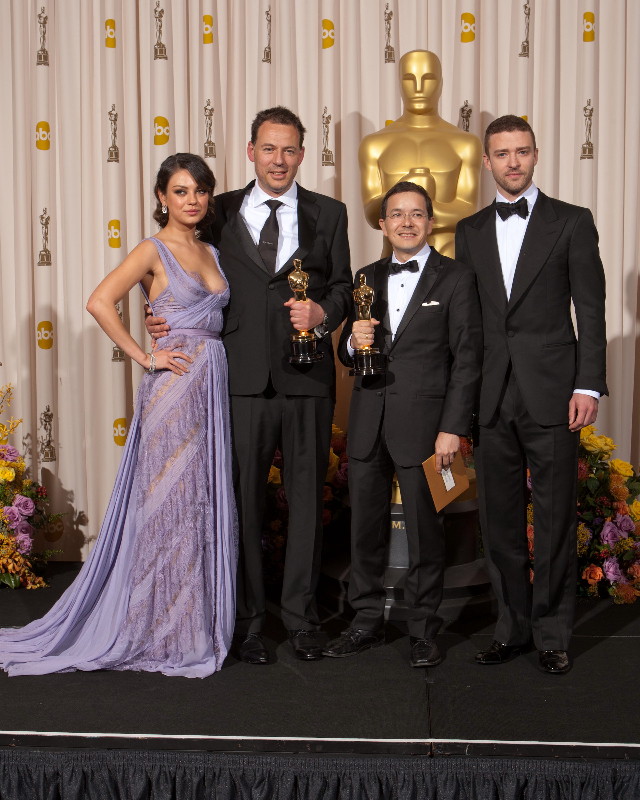 The 2011 Oscars have awarded 'The Lost Thing' as the Best animated short. Check out the full interview with talented filmmakers Andrew Ruhemann and Shaun Tan who reveal how they made the film happen and the journey they took from illustration to CG animation.
The 2011 Oscars have awarded 'The Lost Thing' as the Best animated short. Check out the full interview with talented filmmakers Andrew Ruhemann and Shaun Tan who reveal how they made the film happen and the journey they took from illustration to CG animation.
Congratulations. When did you first write this and how long was this in the making from when you mentioned it to when it actually made the screen?
[Tan] Okay. I originally wrote this story in, I think, 1998. I was an unemployed illustrator. I wrote it on the kitchen table of my share house. Worked on it for a year. Developed it as a picture book, which was then published in Melbourne in the year 2000. Shortly afterward, it was exhibited in an international book fair in Italy, which is where Andrew came across the story. And we began discussions about developing it as an animated film at that point. So, the whole project for me has spanned, I guess, some 13 years.
So, you originally started as an illustrator. How was that going into animation? CG animation nonetheless?
[Tan] Well, I started off as an illustrator with absolutely no formal training aside from high school. And so, when Andrew originally approached me and suggested adapting this for animation, my first reaction was I am not a filmmaker and secondly, (inaudible) and I still managed to do other stuff as an artist. And so, I basically just asked everybody I knew in the film industry about animation, and I started studying handbooks. And also, Andrew came down to both Melbourne and Perth and Western Australia, and we had very intensive story boarding sessions and, I guess, part of that was actually a degree of mentorship. You were explaining to me narrative flow in pictures. I was already working in that in illustrated stories, but film is obviously a different animal and I guess, if anything, it helps me bridge that gap.
This is another win for Australia, this category. What do you think is going on down there in the animation business?
[Tan] You know, it's not just animation. As an illustrator, I know it's in the world of children books (inaudible). It's something to do with the fact that we don't have any existing tradition. Something like that. And we experiment. And we go a little crazy. And a lot of our projects are very small. And our project was extremely small as well. And both Andrew and our producer, it's basically just two other guys. It's one animator which is very unusual for even a short animated film Leo Baker, and one digital artist, Tom Bryant. The three of us; myself, Tom, Leo, we did all the visuals that you see in the whole film over a period of three and a half years. With very little outside intervention or anybody to come in and say, no, it should be like this, it should be like that. We just thought this looks right to us, we will just give it a go, and we thought it worked, and obviously it's working for other people now, too.
[Ruhemann] Can I just add to that, as well? I (inaudible) the Union Jack too. There's a bit of Britain in there.
[Tan] I think that's true. British tradition of animation.
So many of the animated shorts that get nominated are from the big studios auditioning younger directors they are grooming for features. What are your plans now that you got this Oscar in your hand and you got this recognition?
[Ruhemann] I think Shaun and I were talking about that earlier. And I am a producer first, and I started in production as a producer and Shaun, as he said, is an all around artist and illustrator and writer. So, we were both saying that neither of us just want to direct for the sake of directing. If we see a story that really grabs us and we think we should tell it, then we will probably do that and if not we will keep doing our day jobs. The last thing stood out as a story that needed to be told and if we spot another one of those, I suspect we will be having another crack.
[Tan] I second that.
What would you like to say to all your friends back home in Australia?
[Tan] Massive thanks, really. It's really through the support of people in Australia of my work as an illustrator. It's quite a small area of the arts that allowed me to get published in the first place. You know, and there's some thanking in the form of receiving an award and being stunned. But my editor, who edited the book in the first place who thought this is a really good story, let's do it.
All my friends in science fiction, which is where I started, when we were put together tiny, little magazines. Gosh. All my teachers, you know, in school, all my co writers that I worked with over the years, but also all my friends, especially in the world of the picture book illustration community, we are quite a tight bunch, there's not many of us, we don't make a lot of money and we kind of support ourselves by forming these little groups, and yeah, without that support, I am working as a solitary artist in a tiny room in suburban Australia, it would be very difficult to have the motivation that's necessary. So, yeah, thanks, Australia.
Mr. Tan, so, how do you think this is going to change your career, and what is the situation for other animators, the new beginners?
[Tan] Okay. In terms of my career, it's quite hard to say. The most immediate change is that I am standing here answering your questions. But aside from that, I have to say, when I get back home to Melbourne, Australia, and I am in my studio with our free range bunnies and all my pencils, it's all going to be pretty much the same. I have a number of book projects that I'm contracted to do. I will continue to do those. Maybe do more films, we will see. In terms of advice for young artists, based on my own experience, work hard, that's basically it. Just work really hard. If you are a visual artist, draw. Just draw all the time. And finally, just think about the things in yourself that are different to everybody else. And don't think of those as a disability or something negative, but think of it as a positive attribute. Whatever it is that makes you unique, that's what people are interested in. That's what I found out doing this very quirky film.
[Ruhemann] Can I just say one very quick thing? As I hope Shaun won't take offense to this, as the Union Jack thing. If there are any British journalists here, I know we are a very unglamorous section. I always wanted to be on the same program, Radio 4. If there's anybody from Britain here, I listen to it every morning. They don't know I am here, they don't know we won this. So any British journalists, beware. Thank you.











